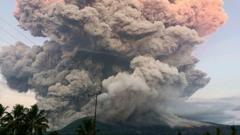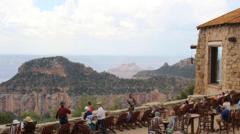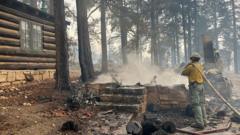After a significant eruption, Indonesian authorities raise alerts and advise evacuations near Mount Lewotobi Laki-Laki.
Mount Lewotobi Laki-Laki Eruption Triggers Highest Alert in Indonesia

Mount Lewotobi Laki-Laki Eruption Triggers Highest Alert in Indonesia
Volcano's ash cloud reaches over 11 km high as authorities enforce exclusion zone
Mount Lewotobi Laki-Laki, one of Indonesia's most notorious volcanic mountains, erupted on Tuesday, releasing a colossal ash cloud that soared over 11 kilometers into the air. This eruption, which occurred at 17:35 local time (10:35 BST), propelled officials to declare the highest alert level due to the risk of volcanic threats impacting the surrounding areas, particularly on the tourist-rich island of Flores.
In response to the volcanic activity, a 7-kilometer exclusion zone has been enforced around the 1,584-meter high volcano. Fortunately, there have been no immediate reports of casualties or significant property damage following the eruption.
Muhammad Wafid, head of the country's geology agency, emphasized that all activities within the exclusion zone are strictly prohibited, citing the risks of lahars—mudflows triggered by volcanic debris—especially if heavy rainfall occurs. Residents in the vicinity have been advised to wear protective face masks to shield against the inhalation of ash.
The National Disaster Mitigation Agency confirmed the evacuation of at least one village, reporting ash rain in multiple communities located beyond the exclusion area. Officials urged residents within the volcano's vicinity to seek safer locations as tremors continue to signal the volcano's heightened activity.
The last time Mount Lewotobi Laki-Laki erupted was in May, prompting authorities to raise concerns and impose similar safety measures. The twin peaks of this volcano, named Laki-Laki—meaning "man" in Indonesian—and Perempuan, which translates to "woman" and stands taller at 1,703 meters, present a striking geological landmark of the region.


















